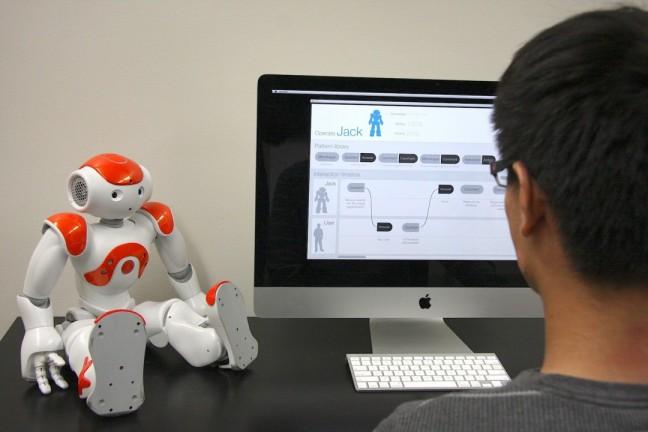A robot communicates with a young boy through different colored cards to help him to read. It’s not able to respond to him as he speaks, but the interaction with the robot is enough to keep the boy motivated to continue reading.
This robot’s name is Mini, and Mini is one example of how University of Wisconsin computer scientists in the Wisconsin Human-Computer Interaction Laboratory have been working to program robots to communicate and interact socially with humans.
Think about an iPhone or computer, computer science professor Bilge Mutlu, said. It completes a series of tasks like downloading a file before communicating to its user that it has finished its task — it’s a similar concept researchers want to do today with robotic technology.
Like iPhones and other electronic devices, research on robotic technology is very task driven, Mutlu explained. The research Mutlu and his lab conducts is centered on programming robots to complete tasks. For example, a robot could participate in activities where they would communicate and coordinate with humans to complete those tasks, he said.

Photo courtesy of Wisconsin Human-Interaction Laboratory
“Robots are a particular complex technology, the design of the communication for that is also very complex” Mutlu said. “One of the things that robotic technology allows us to do to give us interaction paradigms that resemble human interactions … it does [tasks] similar to how a human may do it.”
In the case of Mini, UW researchers are trying to give human teaching techniques to robots, so robots can motivate children to learn more, he explained.
Similarly, robots have also been used in social therapy to communicate with children who have autism, Sean Andrist, computer science graduate student said.
There is something about robots that, for some children, makes them easier to interact with than other people, Andrist said. They create a low stress situation that allows children interact with them in ways they may find difficult with other people.
Andrist’s current work focuses in part of a motivational factor through a subgroup of robotic technology research called “social gaze,” and how a robot might use similar social cues humans use to look different places at different times when communicating with someone.
“There’s a million ways you can do it, how [a robot] can be more motivating,” Andrist said. “Maybe if it’s [the robot] matching your personality it could be more motivating [for a person] to keep working with that robot and do [a] rehabilitation task longer.”
Imagine, Mutlu said, if a patient should need hours and hours of therapy, but a human therapist couldn’t always be there to motivate them to do it — a robot could potentially be beside them, helping complete their rehab.
Though it is true there are areas in which human interaction may be better than robotic interaction, robots could even be beneficial as a source for people to disclose information to when they don’t want to say it to people, Mutlu said.
Configuring how all of the major comments of robotics will fit together and operate smoothly is something that will take years to develop, just like it took years for computers to develop, Mutlu said.
“It’s going to take us a while for us to working through the kinks of getting this complex technology into the human environment,” Mutlu said.


















